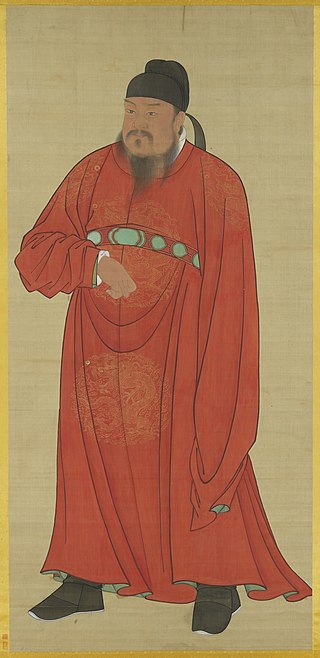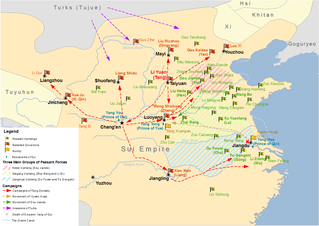Related Research Articles

Emperor Gaozu of Tang was the founding emperor of the Tang dynasty of China, reigning from 618 to 626. Under the Sui dynasty, Li Yuan was the governor in the area of modern-day Shanxi, and was based in Taiyuan.

The Emperor Wen of Sui, personal name Yang Jian (楊堅), Xianbei name Puliuru Jian (普六茹堅), alias Narayana deriving from Buddhist terms, was the founder and the first emperor of the Chinese Sui dynasty. The Book of Sui records him as having withdrawn his favour from the Confucians, giving it to "the group advocating Xing-Ming and authoritarian government." As a Buddhist, he encouraged the spread of Buddhism through the state. He is regarded as one of the most important emperors in Chinese history, reunifying China proper in 589 after centuries of division since the independence of the Cheng Han and Han Zhao dynasties from the Western Jin dynasty in 304. During his reign, the construction of the Grand Canal began.

Emperor Yang of Sui, personal name Yang Guang (楊廣), alternative name Ying (英), Xianbei name Amo (阿摩), also known as Emperor Ming of Sui (隋明帝) during the brief reign of his grandson Yang Tong, was the second emperor of the Sui dynasty of China.

Wang Shichong, courtesy name Xingman (行滿), was a Chinese military general, monarch, and politician during the Sui dynasty who deposed Sui's last emperor Yang Tong and briefly ruled as the emperor of a succeeding state of Zheng. He first became prominent during the reign of Emperor Yang of Sui as one of the few Sui generals having success against rebel generals, and during Yang Tong's brief reign, he was able to defeat the rebel general Li Mi and seize Li Mi's territory. After becoming emperor, however, he was unable to withstand military pressure from Tang dynasty forces, forcing him to seek aid from Dou Jiande the Prince of Xia. After Dou was defeated and captured by the Tang general Li Shimin, Wang surrendered. Emperor Gaozu of Tang spared him, but the Tang official Dugu Xiude (獨孤修德), whose father Dugu Ji (獨孤機) had been executed by Wang, assassinated him.
Feng Lun, courtesy name Deyi, better known as Feng Deyi, formally Duke Miao of Mi, was a Chinese official of the Sui and Tang dynasties who served as a chancellor during the reigns of Emperor Gaozu of Tang and Emperor Taizong of Tang. He was praised for his quick thinking but criticized by historians for his being overly attentive to the emperors' desires.
Yang Xiu (楊秀) was an imperial prince of the Sui dynasty. He was a son of Emperor Wen and his powerful wife Empress Dugu, and during most of his father's reign was given great control over the modern Sichuan and Chongqing region. In 602, after accusations were made that Yang Xiu was abusing his power, Emperor Wen removed him from power and reduced him to commoner rank. He was subsequently held under house arrest for the rest of Emperor Wen's reign and the reign of his brother Emperor Yang. In 618, after the general Yuwen Huaji killed Emperor Yang, he and his co-conspirators briefly considered declaring Yang Xiu emperor, but ultimately decided not to, and instead executed Yang Xiu and his sons.

Yuwen Huaji was a Chinese military general, monarch, and politician of the Sui Dynasty who, in 618, led a coup against and murdered Emperor Yang of Sui. He subsequently declared Emperor Yang's nephew Yang Hao emperor and led Emperor Yang's elite Xiaoguo Army (驍果) north. However, he was then repeatedly defeated by Li Mi, Li Shentong (李神通), and finally Dou Jiande. Believing that his defeat was near and wanting to become emperor before his ultimate defeat, he poisoned Yang Hao and declared himself the emperor of a Xu state. Dou captured him in 619 and killed him.

Luo Yi, known during service to Tang Dynasty as Li Yi (李藝), courtesy name Ziyan (子延) or Ziting (子廷), was a Sui Dynasty official who rose against the rule of Emperor Yang of Sui and occupied the modern Beijing region. He subsequently submitted to Emperor Gaozu of Tang and was created the Prince of Yan and granted the imperial surname of Li. He subsequently, in the struggle between Emperor Gaozu's sons Li Jiancheng the Crown Prince and Li Shimin the Prince of Qin, joined Li Jiancheng's faction. After Li Shimin killed Li Jiancheng in 626 and forced Emperor Gaozu to yield the throne to him, Li Yi was fearful, and he rebelled against Emperor Taizong in 627. He was soon defeated and killed.

The transition from Sui to Tang (613–628) was the period of Chinese history between the end of the Sui dynasty and the start of the Tang dynasty. The Sui dynasty's territories were carved into a handful of short-lived states by its officials, generals, and agrarian rebel leaders. A process of elimination and annexation followed that ultimately culminated in the consolidation of the Tang dynasty by the former Sui general Li Yuan. Near the end of the Sui, Li Yuan installed the puppet child emperor Yang You. Li later executed Yang and proclaimed himself emperor of the new Tang dynasty.
Li Jiancheng (Chinese: 李建成; pinyin: Lǐ Jiànchéng; 589 – July 2, 626, formally Crown Prince Yin, nickname Vaishravana, was the first crown prince of the Chinese Tang dynasty. He was the oldest son of the founding emperor Emperor Gaozu and the crown prince after the founding of the dynasty in 618 CE.
Li Yuanji (李元吉), formally Prince La of Chao (巢剌王), more commonly known by the title of Prince of Qi (齊王), nickname Sanhu (三胡), was an imperial prince of the Chinese Tang Dynasty. He was a son of the dynasty's founder Emperor Gaozu of Tang, and in the intense rivalry developed between his older brothers Li Jiancheng the Crown Prince and Li Shimin the Prince of Qin, he sided with Li Jiancheng and often advocated drastic actions against Li Shimin, including assassination. In 626, Li Shimin, fearing that Li Jiancheng and Li Yuanji were about to kill him, laid an ambush for them at Xuanwu Gate outside the palace and killed them. Li Shimin then effectively forced Emperor Gaozu to yield the throne to him.
The chancellor was a semi-formally designated office position for a number of high-level officials at one time during the Tang dynasty of China. This list also includes chancellors of the short-lived Wu Zhou dynasty, which is typically treated as an interregnum of the Tang dynasty by historians.
Dou Kang, courtesy name Daosheng, was an official and general during the Sui and Tang dynasties who briefly served as a chancellor early in the reign of Emperor Gaozu of Tang.
Chen Shuda, courtesy name Zicong, formally Duke Zhong of Jiang, was an imperial prince of the Chen dynasty, who, after the destruction of Chen, served as an official under the Sui and Tang dynasties, becoming a chancellor during the reigns of the Tang emperors Gaozu and Taizong.
Yuwen Shiji, courtesy name Renren, formally Duke Zong of Ying, was a Chinese monarch and politician of the Sui and Tang dynasties, serving as a chancellor, as Shizhong (侍中) (625–626) and Zhongshu Ling (中書令) (626–627), during the reigns of Emperors Gaozu and Taizong of Tang. He was previously an imperial prince in the short-lived state of Xu (許), which was ruled by his brother Yuwen Huaji.
Pei Ju (547-627), birth name Pei Shiju, courtesy name Hongda, formally Duke Jing of Anyi, was a Chinese cartographer, diplomat, politician, and writer who lived in the Sui and Tang dynasties, briefly serving as a chancellor during the reign of Emperor Gaozu of Tang. He was praised by traditional Chinese historians for his ability and lack of corruption, but blamed for flattering Emperor Yang of Sui and practically directly contributing to Sui's downfall by encouraging many external military campaigns that drained Sui's resources. Modern historians have questioned these assessments: Arthur F. Wright labelled the latter judgement in the Zizhi tongjian a "particularly blatant piece of editorializing" and "absurd ... beyond doubt".

Xiao Yu, courtesy name Shiwen, posthumously known as Duke Zhenbian of Song, was an imperial prince of the Western Liang dynasty who later became an official under the Sui and Tang dynasties. He served as a chancellor during the reigns of the emperors Gaozu and Taizong in the early Tang dynasty.
Wen Dalin (575–637), courtesy name Yanbo, better known as Wen Yanbo, posthumously known as Duke Gong of Yu, was a Chinese official who lived in the early Tang dynasty. He was a key advisor to the Tang dynasty's founding emperor, Emperor Gaozu, and served as a chancellor during the reign of Gaozu's successor, Emperor Taizong. He was captured by the Göktürks and lived among them for years. After he was freed, he drew on his experiences to provide advice to Emperor Taizong on the Tang Empire's policies towards the Göktürks.
Dou Dexuan, formally Baron Gong of Julu (鉅鹿恭男), was an official of the Chinese Tang dynasty, serving as chancellor during the reign of Emperor Gaozong of Tang.
Linghu Defen (583–666), formally Duke Xian of Pengyang (彭陽憲公), was a Chinese historian and politician. He was an official of the Chinese Sui and Tang dynasties. During the Tang era, he was a major proponent for the compilation of the histories of the Sui and its predecessor the Northern Zhou. He was eventually put in charge of compiling Northern Zhou's official history, Book of Zhou, which was completed in 636.
References
- Old Book of Tang , vol. 61.
- New Book of Tang , vol. 95.
- Zizhi Tongjian , vols. 184, 185.